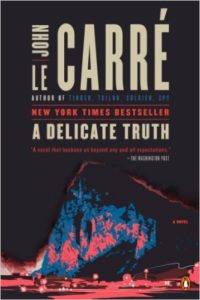 I was a fan of le Carré for decades. I read every one of his novels, from “Call for the Dead” to “A Small Town in Germany” and on forward. He was my favorite author and I’d often buy the full-price hardback when a new novel came out, rather than wait for the paperback.
I was a fan of le Carré for decades. I read every one of his novels, from “Call for the Dead” to “A Small Town in Germany” and on forward. He was my favorite author and I’d often buy the full-price hardback when a new novel came out, rather than wait for the paperback.
Then about ten years ago I started reading literary fiction: Woolf, Faulkner, Coetzee, Ondaatje, Rushdie, Murakama, Flanagan, and more. It was a new world. But I eventually became uneasy with the growing postmodern bent, “novels” with story but no plot, language but no characters, themes but no action and without discernible link back to Aristotle’s Poetics. Can’t anybody just tell a straightforward story anymore, I wondered?
In frustration, I picked up Le Carré’s latest, “A Delicate Truth.” There was an author who knew how to tell a story with panache, I thought. I recalled fondly my enjoyment of such masterpieces as “The Spy Who Came in From the Cold,” “Tinker Tailor…,” and favorites such as “A Perfect Spy” and “The Night Manager.”
I was appalled at how bad it was. Granted, “A Delicate Truth” was vintage le Carré in style. The snappy Etonian English dialogs were there, the effusive insincere bonhomie the English are so good at, the moral ambiguities, the charming linguistic British-isms. But the writing was so clunky, I wondered how I could have ever enjoyed this author’s work. Characters were poorly motivated and behaved in not-believable ways for inexplicable reasons. Editing was heavy-handed, with arbitrary time cuts, flashbacks and reminiscences designed for no reason other than to create artificial suspense by crudely withholding information from the reader – a substitute for genuine literary tension.
Thematically, the novel was same-old, same-old, which you must allow in a le Carré novel. Big, bureaucratic government: bad, individual idealist: good. Resolution: moral ambiguity. Formulaic, yes, but I was ready to allow that in a genre novel.
A black ops anti-terror operation goes south (as they always do in such novels), with collateral damage of two innocent civilians, followed by a coverup (though the operation was covert, so coverup was built into it). The archetypal young, smart, idealistic whistleblower sniffs, then untangles the sorry tale, ascertains where the blame lies, and threatens to “go public” with the whole story, for reasons that are never made clear. Shadowy high government officials issue veiled threats against him and he gets beat up, but in the end… well in the end, nothing happens, which is okay as long as the journey has been a good ride.
However, it was impossible to get worked up about what was at stake. When military drones these days routinely wipe out households, wedding processions and whole road convoys, dozens if not hundreds of civilians are killed, and millions of innocents are displaced, it’s difficult to feel the villainy in this novel’s plot. If the book had come out in the 1980’s maybe it would seem different. Today, you’d have to be extremely naïve to think that covert anti-terror ops are not routine and that they don’t involve collateral damage.
So what is the point of this novel? It has no thought-provoking themes, characters are without believable motivation, the plot is predictable, the language mundane, editing heavy-handed, with low dramatic tension and a weak ending. I think the only reasonable conclusion is that I have been ruined by reading literary fiction and I will never be able to go back to genre, not even to a sentimental favorite like Le Carre. Reader beware.
Le Carré, John (2014). A Delicate Truth. New York: Penguin books. 310 pp.
